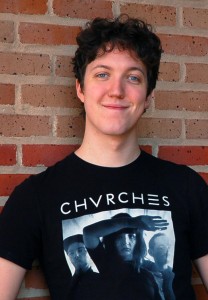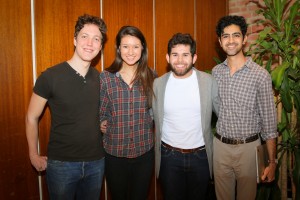 Sean Doyle, a senior in computer science at Rice University, almost graduated without participating in a major hackathon. Then he was recruited by a HackRice team focused on an open-source monitoring system for dementia patients and their caregivers. The team’s app, SKYSync+, won the hackathon’s Grand Prize.
Sean Doyle, a senior in computer science at Rice University, almost graduated without participating in a major hackathon. Then he was recruited by a HackRice team focused on an open-source monitoring system for dementia patients and their caregivers. The team’s app, SKYSync+, won the hackathon’s Grand Prize.
“My major focus on the project was the business logic and conceptual implementation of our plans,” he said. The project itself would allow caretakers of dementia patients to send updates and reminders to a device, like a Pebble Smartwatch. SKYSync+ includes the ability to keep track of the patient as needed, and can check both location and activity levels for the day. Doyle said, “These features allow the caregiver to know if the patient needs a reminder to go for a walk that day, or if the patient begins to stray from certain locations.”

The 2016 HackRice team that created SKYSync+ included Sean Doyle (left), Melissa Hall, Yoseph Maguire, and Kaveet Laxmidas.
This weekend, Doyle graduates with a Bachelor of Arts in Computer Science, but he received a Graduate Research Fellowship from the department and will remain at Rice a fifth year to complete his Master of Computer Science degree.
“The research I’m going to be working on over the next year for my Master’s is on parallelizing an approximate counter developed earlier by [fourth year Ph.D. student] Kuldeep Meel,” Doyle said. “That will be in the works over the next year and a half. Prior to that, my research focused on the Knight’s Tour problem, a thousand-year-old problem centered around your standard chessboard of 8 x 8 squares.”
He described the problem: “The goal was to get an approximate count of the number of tours a knight could take on such a board, with a tour being defined as a path the knight takes through every square on the board exactly once, beginning and ending anywhere.” Doyle said their current tour counter ran into issues and could not return a timely answer because the problem itself is so large. “This acted as a phenomenal example for why we want to parallelize the counter to work more efficiently,” said Doyle.
Running the problem in parallel returns “probabilistically accurate results in a fraction of the time for an exact result,” Doyle said and described other applications for parallelization. “Anywhere that counting problems can grow, like artificial intelligence or probabilistic inference, you may find use for an approximate result returned in a much shorter time,” Doyle said.
He credits his mentor for encouraging him to continue his research. “Since Fall 2014, I’ve been working under Moshe Vardi for my research.” Vardi is the Karen Ostrum George Distinguished Service Professor in Computational Engineering, and also the director for the Ken Kennedy Institute for Information Technology. “Moshe’s been a great asset in my ongoing attempts to really get into the ideas of research,” said Doyle. “He’s the one who convinced me to apply for the research fellowship, and I will be thanking him for that for years to come.”
Sean Doyle completed his B.A. in CS in 2016.
-Juliann Bi, Computer Science Assistant Publicist
